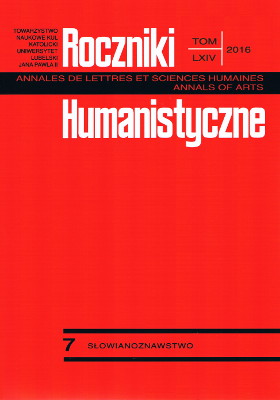Dwa indoeuropejskie rdzenie werbalne oznaczające czynność zbierania
Two Indo-European Verbal Roots Denoting 'To Pick, Gather, Collect'
Author(s): Elwira Kaczyńska, Krzysztof Tomasz WitczakSubject(s): Language and Literature Studies
Published by: Towarzystwo Naukowe KUL & Katolicki Uniwersytet Lubelski Jana Pawła II
Keywords: Indo-European morphology; Indo-European roots; determinatives
Summary/Abstract: There are two verbal roots *sleĝ- (not *leĝ-) and *les- denoting ‘to pick, gather, collect’ in the Indo-European languages. The former root is attested in the central group of the Indo-European languages (Albanian, Greek, Indic, Italic), the latter one represents an Anatolian-Baltic-Germanic isogloss of archaic origin. The root *leĝ- (included in most dictionaries and monographs) should be correctly reconstructed as *sleĝ-. The initial cluster is confirmed by the Albanian phoneme l representing an earlier geminate (Alb. l < Proto-Albanian *ll < IE. *sl), as well as by the Old Indic deverbal form, cf. Sanskrit sraj- f. ‘garland, wreath’, originally ‘collection (of flowers)’ = Lat. lex, legis f. ‘law’, orig. ‘collection (of legal rules, principles)’ (< IE. *sleĝs f. ‘gathering, collection’). The internal evidence taken from the Greek data is noteworthy. Firstly, Aeolic ἐπίλλογος (= Attic-Ionic ἐπίλογος) contains the geminate -λλ-, which can be hardly explained, if the word in question derives from IE. *epi-loĝos. This is why we must suggest the Indo-European archetype *epi-sloĝos, as well as the verbal root *sleĝ-. Secondly, the perfect verbal form εἴλοχα seems to derive regularly from the reduplicated archetype *se-sloĝ-h2e, which points exclusively to IE. *sleĝ- and not to the suggested verb *leĝ-. Thirdly, Doric ἀμφιλλέγω ‘to dispute about, to dispute, to question’ (= Attic ἀμφιλέγω) seems to document a derivation from IE. *ambhi-sleĝō. The verbal root *les-, attested in Anatolian (cf. Hittite lešš- ‘to pick, gather’), Baltic (cf. Lithuanian lèsti ‘to pick up’) and Germanic (cf. Gothic lisan ‘to pick, gather’), should be treated as primitive and Proto-Indo-European (Indo-Hittite). The extended root *sleĝ- (orig. *ls-e-ĝ-) represents an innovation, being derived from the root *les- by means of the verbal suffix -ĝ-. The observed metathesis of initial cluster (*sl- < *ls- < *les- ‘to pick, gather, collect’) is acceptable.
Journal: Roczniki Humanistyczne
- Issue Year: 61/2013
- Issue No: 06
- Page Range: 7-27
- Page Count: 21
- Language: Polish

